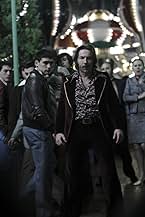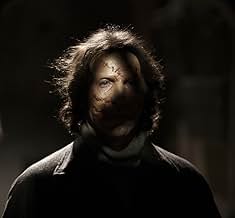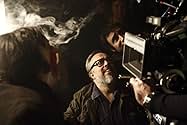A young trapeze artist must decide between her lust for Sergio, the Happy Clown, or her affection for Javier, the Sad Clown, both of whom are deeply disturbed.A young trapeze artist must decide between her lust for Sergio, the Happy Clown, or her affection for Javier, the Sad Clown, both of whom are deeply disturbed.A young trapeze artist must decide between her lust for Sergio, the Happy Clown, or her affection for Javier, the Sad Clown, both of whom are deeply disturbed.
- Awards
- 11 wins & 21 nominations
Alejandro Tejerías
- Motorista-fantasma
- (as Alejandro Tejería)
Sasha Di Bendetto
- Javier (Niño 1937)
- (as Sasha Di Bendetto)
- Director
- Writer
- All cast & crew
- Production, box office & more at IMDbPro
Storyline
Did you know
- TriviaAccording with Álex de la Iglesia, Raphael watched the movie before the public premieres, and he didn't like voice acting of the actor who played him. De la Iglesia offered him to dub himself, and finally is Raphael's voice which is heard in the movie.
- GoofsWhen Andres is arrested, he says "maderos" to the policemen, but this word was not yet used at this time. He shoould have said "grises" (grey) because this is the color of the police uniform - only years later would it become brown. ("Madero" is log or piece of wood, which is why people called policemen "maderos").
- ConnectionsFeatured in Half in the Bag: Robot and The Last Circus (2011)
- SoundtracksTitles
Vocals by Manuel Tallafé
Performed by 'Banda de cornetas de la Fundacion Julian Santos'
2015 Melliam Music
Featured review
"Balada triste de trompeta" (Sad trumpet ballad, in Spanish -I have no idea why they translated it as "The last circus", as it's much poorer) is none short of a masterpiece, in my opinion. It is also a 100% Spanish film, meaning it is a tragicomedy, a totally Spanish genre and it also expands between two crucial moments of Spain's recent history, full of tragic events -the Civil War, the killings, Franco's repression and dictatorship- but also full of grotesque details, situations and characters that were real and now, in retrospect, feel utterly ridiculous, much more so than they were at the time -e.g. when the dictator went hunting, they really prepared the prey for him so that he would look as a great hunter- or are just seen as a byproduct of the times that Spain had to live. Director Alex de la Iglesia also cares to sprinkle the movie with historical events that are apparently disconnected to the main story -like the assassination of Franco's hard man and presumed heir as the new tyrant, admiral Carrero Blanco- but which I believe serve a function to the main metaphor that this movie is.
The movie starts in 1937, in the heat of the Spanish Civil War. A clown is recruited by force to fight with the Republican side, and manages to slaughter quite a lot of Franco's men. His young son, Javier, is traumatized by the whole event and later, in 1973, we meet him again as the new recruit in a circus, the Sad Clown. He can only be the sad clown because he is sad himself, and cannot make children laugh. They pair him up with the Funny Clown, a ruthless but charismatic man called Sergio, who turns out to be the partner to a beautiful trapeze artist, Natalia. Javi falls in love with Natalia and thus starts a rivalry between the two men for the love of a woman, with unforeseeable consequences.
The narration is so filled with colorful characters, crazy comedy, crazy violence mixed with comedy or with surreal elements, historical references, and an underlying sense of tragicomedy, and it is so excessive and full of surprises, one can't help but keep watching, much as it is over the top in many an occasion. You can enjoy the movie at face value and ride the wave of the story for what it is, but you can also watch this movie as a summary and insight into the recent Spanish history and how Spain seems doomed to always be split in two, similar people, brothers, always rivalling and even hating each other, seemingly beyond reconciliation, connecting episodes of sheer senselessness and absurdity with spine-chilling episodes of hate and violence, and all of it boiling down to a tragedy that you can only laugh at because it makes no sense.
I'm not surprised that Quentin Tarantino himself was so taken with this movie, and I wouldn't be surprised if an adaptation of this movie was made soon in an American context.
The movie starts in 1937, in the heat of the Spanish Civil War. A clown is recruited by force to fight with the Republican side, and manages to slaughter quite a lot of Franco's men. His young son, Javier, is traumatized by the whole event and later, in 1973, we meet him again as the new recruit in a circus, the Sad Clown. He can only be the sad clown because he is sad himself, and cannot make children laugh. They pair him up with the Funny Clown, a ruthless but charismatic man called Sergio, who turns out to be the partner to a beautiful trapeze artist, Natalia. Javi falls in love with Natalia and thus starts a rivalry between the two men for the love of a woman, with unforeseeable consequences.
The narration is so filled with colorful characters, crazy comedy, crazy violence mixed with comedy or with surreal elements, historical references, and an underlying sense of tragicomedy, and it is so excessive and full of surprises, one can't help but keep watching, much as it is over the top in many an occasion. You can enjoy the movie at face value and ride the wave of the story for what it is, but you can also watch this movie as a summary and insight into the recent Spanish history and how Spain seems doomed to always be split in two, similar people, brothers, always rivalling and even hating each other, seemingly beyond reconciliation, connecting episodes of sheer senselessness and absurdity with spine-chilling episodes of hate and violence, and all of it boiling down to a tragedy that you can only laugh at because it makes no sense.
I'm not surprised that Quentin Tarantino himself was so taken with this movie, and I wouldn't be surprised if an adaptation of this movie was made soon in an American context.
- How long is The Last Circus?Powered by Alexa
Details
- Release date
- Countries of origin
- Official sites
- Language
- Also known as
- Ballad of the Sad Trumpet
- Filming locations
- Barrio El Partidor, Alcoy, Alicante, Comunidad Valenciana, Spain(as Madrid's suburbs, circus exteriors)
- Production companies
- See more company credits at IMDbPro
Box office
- Budget
- €7,000,000 (estimated)
- Gross US & Canada
- $40,548
- Opening weekend US & Canada
- $4,757
- Aug 21, 2011
- Gross worldwide
- $3,604,598
- Runtime1 hour 47 minutes
- Color
- Sound mix
- Aspect ratio
- 2.35 : 1
Contribute to this page
Suggest an edit or add missing content
































